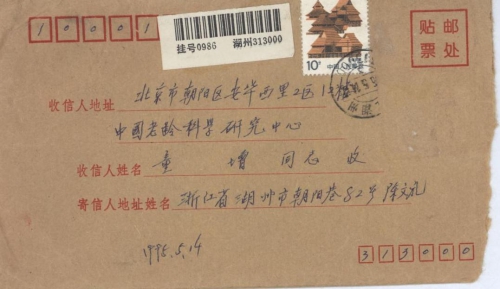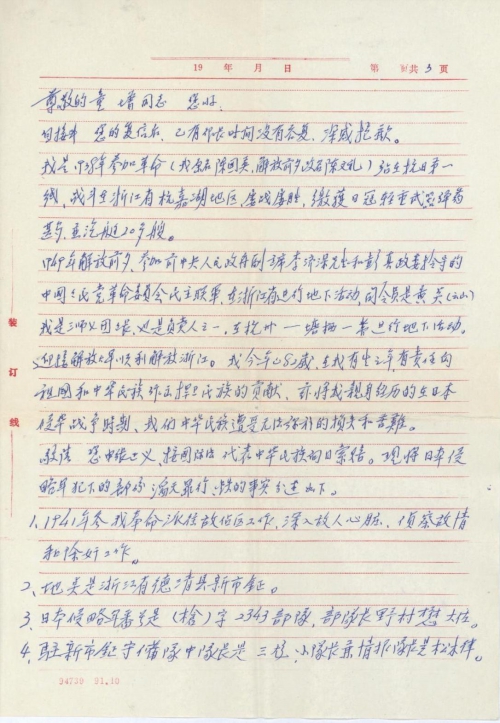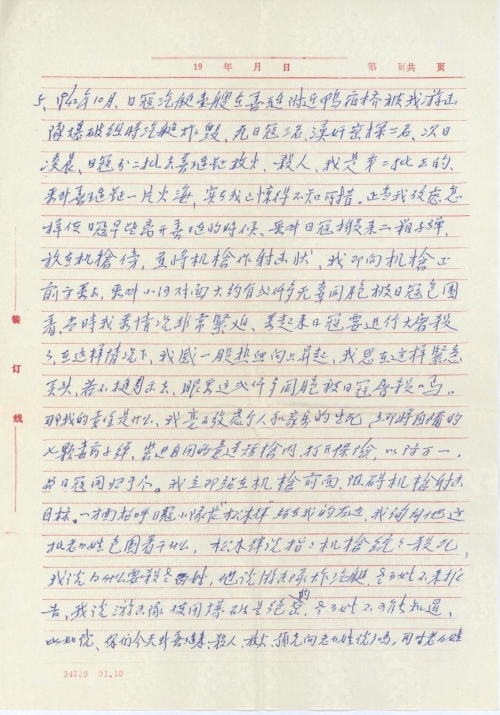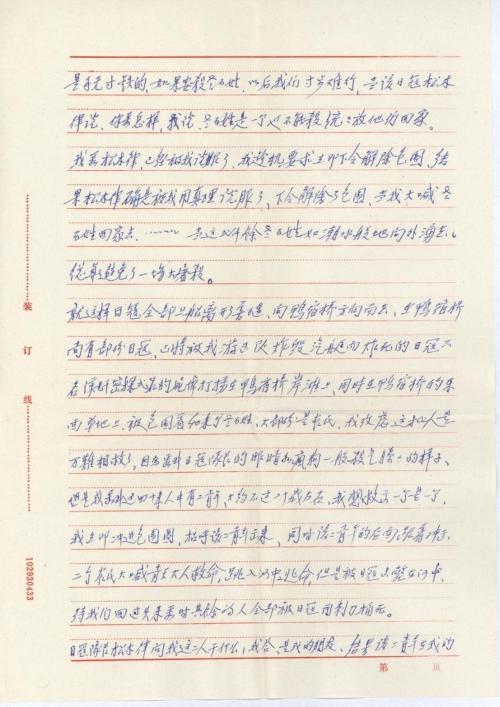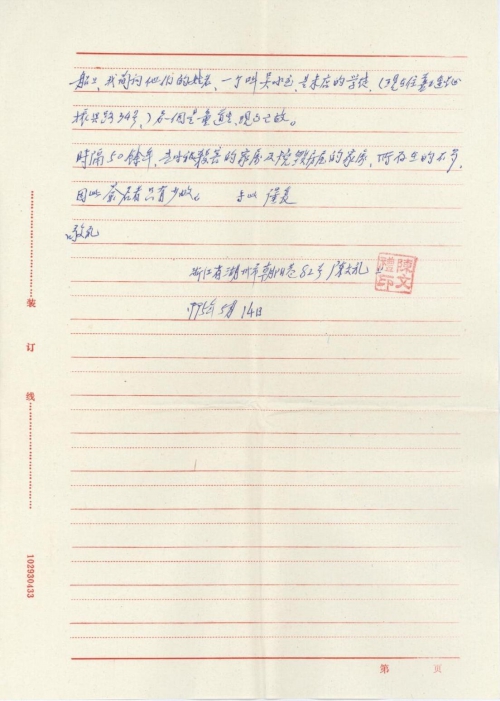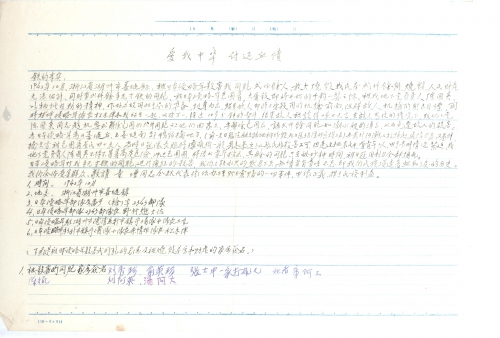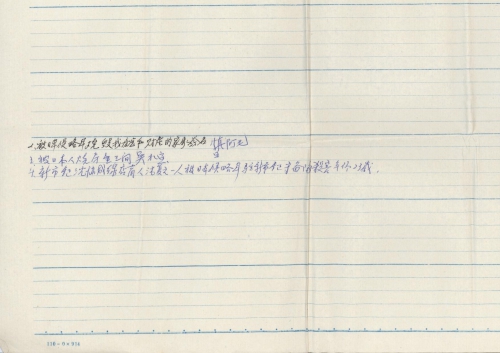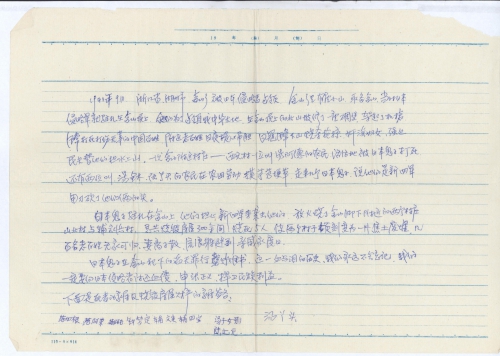Date of letter:1995-05-14
Address of author:Huzhou City, Zhejiang Province
Date of event:1941-09, 1942-10
Location of event:Huzhou City, Zhejiang Province
Name of author:Chen Wenli
Name(s) of victim(s):Tang Ade, etc.
Type of atrocity:Other Massacres, Rapes, Others(OM, RA, OT)
Other details:In September 1941, Huzhou City, Zhejiang fell under Japanese occupation. Innocent people were killed and atrocious crimes were committed by burning, killing, robbing, and raping. People were forced to carrying water for the enemy, and many people including Tang Ade were killed. The Japanese troops stationed in the mountains, fearing of being attacked, burnt down the village under the mountain. Five people were burned to death. In October 1942, houses in Huzhou, Zhejiang were set on fire, and more than forty people were then killed.
Respected Comrade Tong Zeng:
Hello!
It has been a long time since I received your last reply. I was too busy to respond to your letter, my apologies.
I joined the revolution in 1938 (my previous name was Chen Guoying, sometime before the Liberation I changed my name to Chen Wenli). I fought at the forefront of the Anti-Japanese war, in Hangzhou, Jiaxing, and Huzhou areas in Zhejiang Province. I fought many battles and won every one of them, captured a lot of Japanese invaders’ light and heavy weapons and ammunitions, including 20 steamboats.
Before the Liberation in 1949, I joined the Democratic United Army of the Revolutionary Committee of the Chinese Kuomintang led by Mr. Li Jishen, former Deputy Chairman of the Central People’s Government and Peng Zhen, the Political Commissar, to involve in underground activities in Zhejiang Province. Our commander was Huang Yan (Yunshan), I was the Chief of the 7th Regiment of 3rd Division, and one of the key persons in charge. We carried out underground activities in Hangzhou—Tangqi area, and welcomed the Liberation Army to successfully liberate Zhejiang. I’m 82 this year. While I am alive, I have the obligation to make contributions to safeguarding the honor of my motherland and the Chinese people. I hereby give a summary of my personally experienced irreparable losses and hardships afflicted on the Chinese people during the Japanese invasion war period.
I request you to uphold justice, abide by international laws to demand compensation from Japan on behalf of the Chinese nation. I hereby list some of the towering crimes committed by the Japanese Invasion Army and irrefutable facts as follows.
1. In 1941 I was dispatched to the occupied area to work. The mission was to enter the enemy’s heartland, reconnoiter enemy movements and remove traitors.
2. The venue is Xinshi Town, Deqing County, Zhejiang Province.
3. The Japanese Invasion Army’s troop code is (Q) No. 2343 Army, which was led by Colonel Nomura Shigeru.
4. Squadron leader of the Garrison Troop at Xinshi Town is Sanbiao, Squad Leader and Intelligence Team Leader was Matsuki Ritsu.
5. In October 1942, one steamboat of the Japanese invaders was bombed by the explosion team of our guerrilla at Yasuqiao near Shanlian, where three Japanese soldiers and two Chinese traitor spies died. In early morning of the next day, the Japanese invaders went to Shanlian Town to set fire to houses and kill people in two batches. I arrived in the third batch. When I arrived at Shanlian Town, it was already engulfed in fire, for which I really felt startled. As I was considering how to move the Japanese away from Shanlian as soon as possible, I saw the Japanese soldiers fetched two boxes of ammunitions beside the machine gun, and placed the machine guns in a radiating fan shape. I looked toward the pointing direction of the machine guns, and saw about 3000 innocent compatriots surrounded by Japanese solders just on the opposite of the stream. I recognized that it was a very critical moment; it seemed the Japanese would start slaughter very soon. At that moment, I felt a spurt of hot blood rising inside myself; I thought that at such critical juncture, if I didn’t interfere, I would have to witness the 3000 plus compatriots being killed by the Japanese invaders on the spot, then what were my duties for? Without giving any consideration to my personal and family safety, I immediately loaded seven self-made poison bullets into my Italian made pistol, released the safety catch, and prepared to die with the Japanese invaders in case of emergency. I immediately stood in front of the machine guns to block the shooting target. Meanwhile I called the Japanese Squad Leader “Matsuki Ritsu” to stand in my left, I asked him ‘why this group of residents were surrounded’. Matsuki Ritsu pointed at the machine guns and said to kill them all. I asked why? He said the guerrilla bombed the steamboats, and the residents failed to report it in advance. I said “the guerilla’s explosion activity was absolutely a military secret, the common people had no knowledge of it whatsoever. For instance, today you came to Shanlian to kill people and set fire, have you told the residents before hand? Also the residents were not armed, if the commoners were killed, we would find it difficult to do anything in our daily life. The Japanese invader Matsuki Ritsu then asked, “so what should we do?”. I said, “let them go.” I looked at Matsuki Ritsu, who was obviously convinced by my reasoning I seized the opportunity to ask him to end the siege. Finally, Matsuki Ritsu was indeed persuaded by me, and ordered to end the siege. When I shouted to tell the residents to go home, the three thousand plus residents rushed out like a receding tide; fortunately a slaughter was avoided.
Subsequently the Japanese soldiers boarded the boat and left Shanlian moving toward the direction of Yasuqiao. On the Yasuqiao beach, there was a group of Japanese soldiers who were recovering the bodies of the three Japanese soldiers and two traitor spies killed when the steamboat was destroyed by our guerrilla. Meanwhile in the grassland east of Yasuqiao, 40 residents were surrounded, most of them were farmers. I thought they were probably beyond rescue because the team leader of the Japanese army was furious with murderous eyes like a mad dog. Yet at the same time I saw two youths in this group of 40 people, they were about 20. I told myself saving one is better than none, so I immediately rushed into the circle, and called the two youths out; meanwhile two farmers behind these two youths followed to rush out, shouting ‘Help’, and jumped into the river to flee, but they were shot dead in the river. When we turned around to see, the remaining people were all killed by the Japanese soldiers with bayonet.
The Japanese team leader Matsuki Ritsu asked me who those two youths were, I said they were my friends, and these two youths were transferred to my boat. I asked for their names – one was Wu Shuili, an apprentice of Weidian (now living at 34 Zhengxing Road, Shanlian District), another was Tong Daosheng, now deceased.
Since the above happened more than 50 years ago, few relatives of the victims being killed and those whose houses were burnt are still alive today, therefore only very few signatures are available.
Regards
Yours faithfully
Chen Wenli (Signature & seal)
82 Chaoyang Lane, Huzhou City, Zhejiang Province
May 14, 1995
Love China Repay the Debt of Blood
Irrefutable facts:
In October 1942, in Shanlian Town, Huzhou City, Zhejiang Province, the Japanese Invasion Army killed more than 300 persons of our compatriots, set fire and burned more than 3000 civilian houses, properties being destroyed were inestimable. Meanwhile over 3000 unarmed compatriots were surrounded by the Japanese Invasion Army. At the critical moment before a slaughter happened, Chen Guoying, a chief person of our underground party organization, who was fully prepared for self sacrifice and perishing together with the enemy, stood out to the front of the machine gun with which the enemy would use to start the slaughter. In this way he obstructed the enemy’s shooting target and he called out to Matsuki Ritsu, team leader of the Invasion army, to stand with him just in case they started firing. After 10 minutes of battle of wits, in the end the enemy was rendered speechless by his persuasion. When the enemy was thinking over the matter, Comrade Chen Guoying of our underground party took advantage of the moment to ask the 3000 compatriots to return home. After the siege ended, these 3000 compatriots left like a tide, a mass killing by the enemy was avoided. The Japanese Invasion Army left Shanlian to Yasuqiao south of Shanlian (on the previous day one Japanese steamboat was destroyed here, 3 Japanese soldiers and 2 traitor spies died). When seeing the five bodies on the river beach, and over 40 farmers being surrounded at the east end of the bridge, the Japanese team leader was furious like a mad dog and determined to kill these farmers. In this group of farmers, there were two youths. Seeing the urgency of the circumstance, Chen Guoying, chief person of our underground party organization, risked personal danger to rush into the circle, and pulled out these two youths. The remaining compatriots were stabbed to death within several seconds by the Japanese soldiers.
About the indiscriminate killing of our unarmed compatriots by the Japanese Invasion Army, we cannot remain silent forever. Those in the know have the responsibility not to forget our nation’s history steeped in blood and tear. Speaking on behalf of all victims of the damage, we request Comrade Tong Zeng to represent us with full authorization to handle all matters related to the compensation claim, uphold justice, and safeguard national interest.
1. Time: October 1942
2. Venue: Shanlian Town, Huzhou City, Zhejiang Province
3. Japanese Invasion Army troop and code name (Q) Troop 2343
4. Leader of Troop 2343 of the Japanese Invasion Army: Colonel Nomura Shigeru
5. Squadron Leader of the Garrison Troop of Japanese Invasion Army stationed at Xinshi Town, Deqing County, Huzhou City: Sanbiao
6. Squad Leader & Intelligence Team Leader of the Japanese Invasion Army in Xinshi Town Garrison Troop: Matsuki Ritsu
(The following is the list of signatures of family members being killed by the Japanese Invasion Army and the members of families whose houses and properties were burned)
1. Signature of family members of compatriots being killed:
Liu Xiuzhen, Yu Yingzhen, Zhang Shizhong family, Song Asan
Chen Wenli, Liu Aying, Tang Ada
2. Signature of members of families whose houses and properties were burned by the Japanese Invasion Army
3. Three houses were burnt by the Japanese: Wu Shuibao
4. Shen Fuyuan, a merchant of Shenxiecheng Thread Shop in Xinshi Town, was killed by the Garrison Troop of the Japanese Invasion Army in Xinshi Town, aged 23
In September 1941, the Hanshan Town of Huzhou City in Zhejiang Province was occupied by the Japanese invaders, Hanshan Town includes Juzishan. The Japanese Invasion Army was stationed on top of the Hanshan Mountain. In order to occupy the land of China, they built a blockhouse on the northern slope at the top of Hanshan Mountain, there they erected machine guns to kill and injure innocent Chinese residents frequently. Nearby residents were frightened day and night, the Japanese soldiers often went into the village to burn, kill and loot, raped women, conscripted civilian laborers to carry water up the mountain for them. Once in Xiyuan Village, a village near Hanshan, a farmer named Tang Ade was beaten to death by the Japanese invaders. Two other farmers named Tang Jinmu and Lu Yatou were working in the field, digging taro and weeding, several Japanese invaders walked up to them, and said they were the New Fourth Army, and beheaded them with knife.
Japanese invaders were stationed on the Hanshan Mountain, they were worried about attacks from the New Fourth Army, and set fire to two villages at the foot of the Hanshan Mountains. More than one hundred families became homeless, , they wandered around and fled to relatives’ home.
Japanese invaders committed towering crimes beyond description in Hanshan, we will never forget this history of blood and tear. We must demand repayment of debt of blood from the Japanese government, uphold justice, and safeguard national interest.
The following are signatures of the family members of the deceased and the members of the families whose houses and properties were burnt:
Fan Jiagen, Fan Arong, Fan Amao, Zhong Mengding, Fu Wenlai, Fu Sibao, Tang Zina, Tang Yatou, Lu Wenyuan














